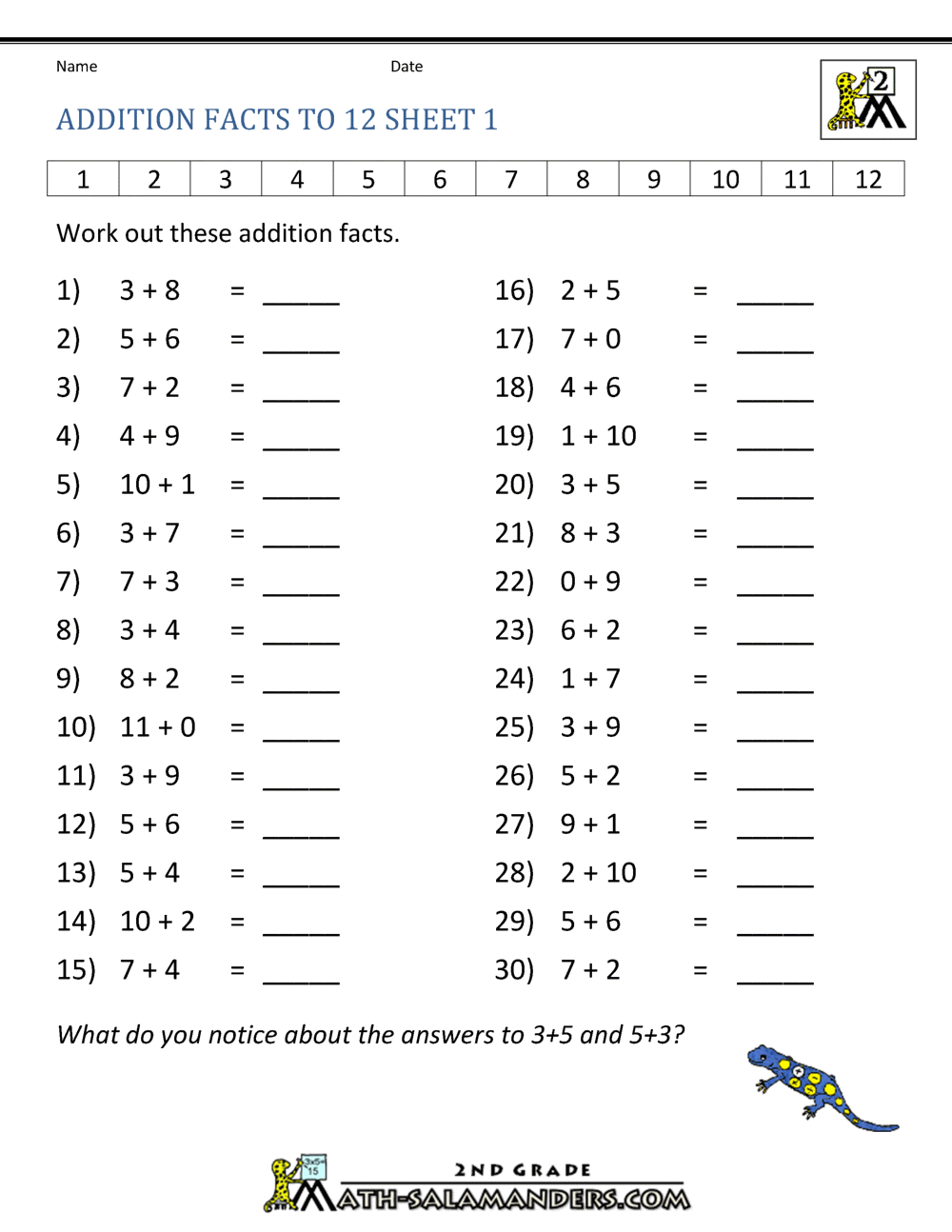Unlocking Lightning-Fast Math: Your Guide to Mastering Addition Facts
Ever find yourself fumbling with simple addition problems? Wish you could calculate sums in a snap? Mastering addition math facts is like having a secret weapon in your mathematical arsenal. It's the foundation for more complex calculations, and it unlocks a whole new level of numerical fluency.
Addition, the fundamental building block of mathematics, is something we encounter from early childhood. We start with counting fingers and toes, and then progress to adding small quantities of objects. This foundational skill becomes ingrained in our daily lives, from calculating grocery bills to measuring ingredients for a recipe.
The formal practice of memorizing addition facts, however, has a more structured history. While the precise origins are difficult to pinpoint, the emphasis on rote memorization became prominent with the rise of standardized testing and the need for efficient calculation in various fields. Think about it – centuries ago, complex calculations often required tools like the abacus. Instant recall of basic addition facts simply wasn’t as critical as it is in today's fast-paced world.
The importance of addition facts practice cannot be overstated. It frees up mental capacity for more challenging mathematical concepts. Imagine trying to solve a multi-step word problem while also struggling to remember 7 + 8. The cognitive load becomes overwhelming. By automating basic addition, you can devote your brainpower to higher-level thinking and problem-solving.
However, the journey to mastering these facts can be fraught with challenges. Some students struggle with memorization, while others find the repetitive nature of practice tedious. The key is to find engaging and effective methods that cater to different learning styles.
Addition math facts refer to the sums of single-digit numbers. For example, 3 + 4 = 7 is an addition fact. Practicing these facts involves repeatedly solving them until they become automatic. A simple example is using flashcards with an addition problem on one side and the answer on the other.
Benefits of mastering addition facts include increased speed and accuracy in calculations, improved confidence in math abilities, and a stronger foundation for more advanced mathematical concepts. For instance, a student who instantly knows 8 + 5 = 13 can quickly move on to more complex problems involving larger numbers or multiple operations.
Create an action plan: Start with a diagnostic assessment to identify areas of weakness. Then, focus on practicing a specific set of facts each day, using various methods like flashcards, online games, and timed drills. Track your progress and celebrate milestones to stay motivated.
Checklist: Have you practiced all addition facts from 0 to 9? Can you recall them instantly? Are you comfortable applying these facts in word problems and real-life scenarios?
Step-by-step guide: Choose a set of facts to focus on. Practice using flashcards or an online game. Test yourself regularly. Review and reinforce weaker facts.
Recommendations: Check out websites like Math Playground and Khan Academy. Flashcard apps and workbooks are also widely available.
Advantages and Disadvantages of Addition Math Facts Practice
| Advantages | Disadvantages |
|---|---|
| Increased speed and accuracy | Can be tedious if not approached creatively |
| Improved math confidence | Potential for rote memorization without understanding |
| Strong foundation for advanced math | May not address individual learning styles |
Best Practices: Use varied methods, practice regularly, incorporate games, track progress, and celebrate success.
Real Examples: Calculating the total cost of items at a store, determining the score in a game, measuring ingredients for a recipe, figuring out change after a purchase, splitting a bill among friends.
Challenges and Solutions: Boredom – incorporate games and varied activities. Difficulty memorizing – try visual aids or mnemonic devices. Lack of motivation – set goals and reward progress.
FAQ: What are addition facts? Why are they important? How can I practice them? What if I struggle with memorization? How long does it take to master them? What resources are available? How can I make practice fun? What are some real-world applications?
Tips and Tricks: Use visual aids like number lines or manipulatives. Create rhymes or songs to help memorize facts. Practice in short bursts throughout the day.
In conclusion, mastering addition math facts is a crucial step towards achieving mathematical proficiency. It’s the bedrock upon which more complex calculations are built. While the journey might present some challenges, the rewards are well worth the effort. Increased speed, accuracy, and confidence in math will not only benefit students academically, but also empower them in various aspects of their lives. From managing finances to pursuing STEM careers, a strong grasp of addition facts is an invaluable asset. Take advantage of the numerous resources available, experiment with different learning strategies, and most importantly, persevere. The ability to effortlessly calculate sums will open doors to a world of mathematical understanding and unlock a lifetime of numerical fluency. So, embark on this exciting journey of mastering addition math facts and witness the transformative impact it has on your mathematical abilities and beyond. Don't wait, start practicing today and unleash your inner math whiz!
Coping with pet loss a guide to healing
Macon georgia power outage map your guide
Unleash your inner artist nail design inspiration














